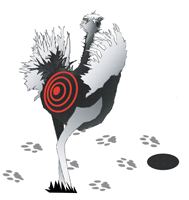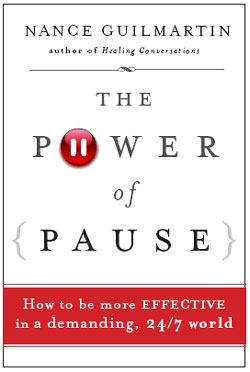|
|

|
CRISIS MANAGER
The Internet Newsletter about Crisis Management
Editor: Jonathan Bernstein
"For Those Who Are Crisis Managers,
Whether They Want to be or Not"
ISSN:1528-3836
� 2010 Jonathan Bernstein
|
Volume XI, Number 02
| January 25, 2010
|
|
JUST A THOUGHT
Are you too stuck in "Us v. Them" to
put yourselves in Their shoes and figure out how to connect with Them?
|
|
|
FROM THE EDITOR I have written and spoken extensively about how the roots of many crises start at the customer service level. One employee in a bad mood can inadvertently cause immense damage in a world where reactions can go from mouth to Internet in moments. That's why I was so pleased to receive a review copy of Nance Guilmartin's "The Power of Pause," whose concepts I find equally applicable to both my professional and personal lives. The publisher allowed me to bring you an excerpt from the beginning of a chapter called "What Happens When We're Wired to Snap?" Then the colorful and enthusiastic Monte Martin addresses a topic which strikes fear in the heart of spokespersons everywhere -- the Ambush Interview. I tripped across Monte's blog, where a version of this piece appeared, and secured her permission to bring it to the virtual pages of this ezine. As of a few days from now, on February 2, Crisis Manager will be 10 years old. And Bernstein Crisis Management turned 16 on January 4. These two children of mine have grown up in service to my clients and subscribers, and I am grateful for all the support and kind words you have returned in exchange. A word of apology to plain text readers; I am still learning how to use my new Constant Contact service and didn't realize that I needed to separately edit the plain text version after formatting the HTML one. This issue should look a lot better to you!
As always, if you like what you see -- please, share it with others and tell them to subscribe!

My best to all, Jonathan
|
WHAT HAPPENS WHEN
WE'RE WIRED TO SNAP?
From The Power of Pause
by Nance Guilmartin
This is today's challenge: in our rush, we don't realize that we've missed something important - a fact, an intention, a tone, a subtle expression, an unperceived issue, history, or a new reality. Later we wish we'd taken even a moment to ensure that what we thought we understood was what someone really meant. What's lost is priceless: the power of curiosity in action.
From the moment the day begins, we are juggling work and our personal lives. Before we know it, we're making snap decisions or we're snapping at each other. When we don't feel that we have the time or the need to get curious we can (1) get angry or defensive or (2) make hasty decisions.
Working and living at this pace, we can unwittingly trigger a costly chain reaction that sends customers running to the competition or charging to the Internet to complain. We can unleash reactions that fan the flames of employee or investor rumors and cost us, or someone else, a job. Or, when we feel we're right, defending our assumptions can suddenly threaten a valued relationship. If, however, we can shift into neutral and become genuinely curious, we can prevent a costly mistake.
It's so easy to forget: most upsets are the result of unexpressed or misunderstood expectations. Numerous research studies reveal that expectations shape what we see, hear, sense, and value. In a study published in the Journal of Marketing Research, authors Baba Shiv, Ziv Carmon, and Dan Ariely pointed out that our reality is shaped by our expectations. For example, when research subjects were told that an item they were given to use was expensive, they thought that it worked better than those participants who were told that the products they were using were inexpensive. However, the products were exactly the same. We're also surprised when something isn't what we anticipated or were led to believe. A pause can "reset" us to neutral. Then we'll be more effective when the unexpected happens.
At this point, you might be thinking to yourself, OK, so now that it's time to shift, the clutch is disengaged, my foot is off the accelerator - what am I supposed to do with this pause? In the real world, I do need to get going - to get others and myself in gear, jump - start a project, or give someone an answer. I'm expected to get it together and move on, and it had better be right the first time.
You're absolutely right. The urge to act makes it hard to put our brain and emotions on hold or to insert a pause rather than automatically react. In a Boston Globe article, Jonah Lehrer, author of How We Decide, explains that experts are seeing the act of decision making with fresh eyes, suggesting that "the best predictor of good judgment isn't intuition or experience or intelligence. Rather it's the willingness to engage in introspection, to cultivate what Philip Tetlock, a psychologist at the University of California, Berkeley, calls 'the art of self - overhearing.'"
How can you engage in introspection, especially when you're under pressure to react? (Editor's Note: Sorry, you'll have to read the book to find that out!)
Reprinted by permission of the publisher, John Wiley & Sons, Inc., from The Power of Pause: How to be More Effective in a Demanding, 24/7 World. Copyright (c) 2010 by John Wiley & Sons, Inc. All rights reserved. Available at all leading booksellers. Amazon price: $15.96. |
|
THE AMBUSH INTERVIEW:
TAMING THE WILD ANIMAL
By Monte Martin
A reporter sticks a microphone or camera in your face. What do you do? What do you say? When a wild animal is ambushed, it cer tainly reacts. A lion roars. An antelope runs. And, a possum plays dead. When ambushed by a reporter, you too may be tempted to yell, run or ignore the questions, but since the camera is likely rolling, anything you say or do can end up on television or fly across the Web. tainly reacts. A lion roars. An antelope runs. And, a possum plays dead. When ambushed by a reporter, you too may be tempted to yell, run or ignore the questions, but since the camera is likely rolling, anything you say or do can end up on television or fly across the Web.
There is a right way to take on pesky reporters who lie in wait, but first, be sure you always avoid these common tendencies:
- Saying "No comment."
- Pretending the reporter and camera are not there, continuing to go on about your business or leaving the area without saying a word.
- Attempting to garble an answer or blurt something quickly to seemingly satisfy the reporter. In all likelihood, even if you know your topic and have the right the answers, you will still have that surprised deer-in-the-headlights look pasted on your face.
- Not asking the reporter to call your office to schedule an appointment.
- Never suggesting that the reporter gives you a list of questions so that you can get back to them later with the answers.
Reporters are people. They appreciate being acknowledged and like Mom always said, politeness counts! Never brush off a reporter! They have an assigned story to do and you (good or bad) have a story to tell. How the ambush is handled can turn a story from bad to worse, bad to much better, and maybe even as far as decent.
When ambushed by a reporter, the following steps are the best for engaging with a reporter and taking control of the situation:
- Stop, smile, look the reporter in the eyes (not at the camera).
- Politely respond with the following:
"Thanks
for your interest in interviewing me. I would be more than happy to
speak with you, but right now I am about to...step into a meeting,
leave to pick up my child from school, file a report, meet with my
staff, rehearse for an important presentation, etc. (something credible
and real). Now, let's set something up for (later this afternoon, this
evening, or in the morning-the CEO inserts time of day to allow for
prep time). This way, we can sit down and have plenty of time for me to
answer all of your questions."
- Now that you are in control of the time, you can also be in control of the location. Sometimes it is not in the company's best interest to not have a reporter and camera roaming around your office or disrupting the work environment. Depending on the situation, consider offering to do the interview at their station, a public location or setting it up at your workplace.
As a spokesperson, you'd be surprised how many times reporters are impressed when I offer to come to them. Reporters are usually on a deadline and I have found that by offering to do the interview at their station, you soften the blow by offering to come on their turf when you put the interview off for a later time.
There is also something to it when the reporter/station plays host to you vs. the other way around. As the host, I have found that the reporter may not be as aggressive or "in-your-face" with questions. Note my "may not." Always be primed for a surprise attack no matter how gentle the journalist appears.
The interview is set. Now what?
- Immediately call the communications team to advise them of the scheduled interview.
- The company's PR person should call the reporter and ask if there are specific questions or areas of interest for the interview. Also, offer to provide backgrounders, bios, or fact sheets about the company, or issues that may give the reporter more in-depth information. More is always better than less!
- Compile and email the information to the reporter in advance of the interview if possible. This is a good procedure to do if the background materials are technical or detailed in nature.
- The communications staff should gather other appropriate information for the interview including key messages, talking points, FAQs, backgrounders, fact sheets and answers to hard-hitting questions (these are answers to questions you'd imagine a reporter would never ask, but if they have done their homework or ask one of those out there questions, then you are prepared).
- Then, if time allows, familiarize yourself with the materials before the interview.
Men, be sure to straighten your tie or shirt collar. Ladies, powder your nose and dab on some lipstick. Then, be sure there isn't any green stuff in your teeth, stand up straight and interview with confidence because now you are the ringmaster of the media circus.
Monte Martin is president of WOW! Marketing, Public Relations & Events. http://MonteMartin.blogspot.com and http://www.linkedin.com/MonteMartin. |
|
BUSINESS ANNOUNCEMENTS
(aka blatant self-promotion) A Riddle
What has 80 pages of hard-hitting, entertaining and easy-to-read guidance on how to deal with both traditional and online media during times of crisis? The answer is the soon-to-be-published Keeping the Wolves at Bay - Media Training. This isn't merely an update of Jonathan Bernstein's well-known Keeping the Wolves at Bay: A Media Training Manual, which was delivered as a black and white, ring-bound, card-stock document, but is actually a dramatic improvement over the previous publication, both in content and in look. Keeping the Wolves at Bay - Media Training is a four-color, perfect-bound, 8x10 book. The price, however, will be the same: $25 per hard copy; $10 per PDF copy.
Here's a couple of teaser reviews for you:
When you get well
known for what you do, the media will want to interview you, which is a good
way to get your message out or alternatively, to look really bad. You need to
be prepared for interviewers who might tell your story straight -- or who might
do the opposite. I've found that Jonathan Bernstein's book and training are
real-life preparation for whatever can happen, and they've helped me get the
real stuff out there, and helped keep me out of trouble!
Craig Newmark - Founder, craigslist
Even if you think
you'll never, ever be interviewed by the media, buy this book and read it cover
to cover. It isn't a substitute for media training. But it will give you the
tools and confidence to go head to head -- and possibly even defang -- rabid reporters,
blood-thirsty bloggers and social networking buffoons who are out to besmirch
your good name. Joan Stewart, The Publicity Hound
Individual sales will be announced soon, but organizations interested in deeply discounted quantity purchases for internal use and/or as premiums to give to important business contacts should contact [email protected]. Current titles remain on sale at the Crisis Manager Bookstore Want To Blog
And Tweet About
Your Organization But Don't Have Time?
Missing out on all the promotional and SEO
advantages of doing so? Hire someone to be your voice...like Erik Bernstein,
aka "Son of Crisis Manager."
More info:[email protected].
|
GUEST AUTHORS
GUEST AUTHORS are very welcome
to submit material for "Crisis Manager." There is no fee paid, but most
guest authors have reported receiving business inquiries as a result of
appearing in this publication. Case histories, experience-based
lessons, commentary on current news events and editorial opinion are
all eligible for consideration. Submission is not a guarantee of
acceptance.
|
ABOUT THE EDITOR & PUBLISHER
Jonat han Bernstein is president of Bernstein Crisis Management, Inc., a national crisis management public relations agency providing 24/7
access to crisis response professionals. The agency engages in the full
spectrum of crisis management services: crisis prevention, response,
planning & training. He has been in the public relations field
since 1982, following five-year stints in both military intelligence
and investigative reporting. Write to [email protected]. han Bernstein is president of Bernstein Crisis Management, Inc., a national crisis management public relations agency providing 24/7
access to crisis response professionals. The agency engages in the full
spectrum of crisis management services: crisis prevention, response,
planning & training. He has been in the public relations field
since 1982, following five-year stints in both military intelligence
and investigative reporting. Write to [email protected].
|
|
LEGAL
DISCLAIMER
All
information contained herein is obtained by Jonathan Bernstein from sources
believed by Jonathan Bernstein to be accurate and reliable.
Because of
the possibility of human and mechanical error as well as other factors, neither
Jonathan Bernstein nor Bernstein Crisis Management is responsible for any
errors or omissions. All information is provided "as is" without
warranty of any kind. Bernstein Crisis Management and Jonathan Bernstein make
no representations and disclaim all express, implied, and statutory warranties
of any kind to the user and/or any third party including, without limitation,
warranties as to accuracy, timeliness, completeness, merchantability, or
fitness for any particular purpose.
Unless due
to willful tortuous misconduct or gross negligence, Jonathan Bernstein and
Bernstein Crisis Management shall have no liability in tort, contract, or
otherwise (and as permitted by law, product liability), to the user and/or any
third party.
Under no
circumstance shall Bernstein Crisis Management or Jonathan Bernstein be liable
to the user and/or any third party for any lost profits or lost opportunity,
indirect, special, consequential, incidental, or punitive damages whatsoever,
even if Bernstein Crisis Management or Jonathan Bernstein has been advised of
the possibility of such damages.
A service
of this newsletter is to provide news summaries and/or snippets to readers. In
such instances articles and/or snippets will be reprinted as they are received
from the originating party or as they are displayed on the originating website
or in the original article. As we do not write the news, we merely point
readers to it, under no circumstance shall Bernstein Crisis Management or
Jonathan Bernstein be liable to the user and/or any third party for any lost
profits or lost opportunity, indirect, special, consequential, incidental, or
punitive damages whatsoever due to the distribution of said news articles or
snippets that lead readers to a full article on a news service's website, even
if Bernstein Crisis Management or Jonathan Bernstein has been advised of the
possibility of such damages. Authors of the original news story and their
publications shall be exclusively held liable. Any corrections to news stories
are not mandatory and shall be printed at the discretion of the list moderator
after evaluation on a case-by-case basis.
|
|
|
|
|
|
|
|